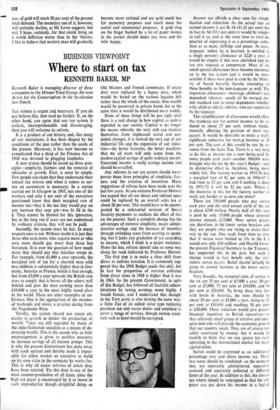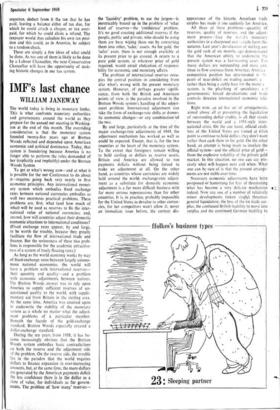Where to start on tax
BUSINESS VIEWPOINT KENNETH BAKER, MP
Kenneth Baker is managing director of three companies in the Minster Trust Group. He won Acton for the Conservatives in the by-election last March.
Tax reform is urgent and necessary. If you do not believe this, then read no further. If, on the other hand, you agree that our tax system is archaic, incomprehensible and discouraging, then you will welcome its reform.
It is a product of our history and, like many of our institutions, it has been shaped by the conditions of the past rather than the needs of the present. Moreover, it has now become so complicated that a third of the Finance Act of 1968 was devoted to plugging loopholes.
A new system should be based on three prin- ciples—simplicity, fairness and the removal of obstacles to growth. First, it must be simple. Few people can claim that they understand their annual tax returns and when it comes to sur- tax an accountant is necessary. In a survey carried out in Glasgow in 1967, not one of the workers and only 6 per cent of the executives questioned knew that their marginal rate of income tax—that is the tax they would pay on any increase they may get—was 6s 5d in the £. They cannot be blamed for this ignorance, but in the long run if taxes are not understood by ordinary citizens, they will not be paid.
Secondly, the system must be fair. In many respects ours is not. Without doubt it is just that those who earn more, who acquire more or who own more should pay more than those less fortunate. It is over the question of how much more they should pay that injustice creeps in. For example, from £1,000 a year upwards, the marginal rate of tax for a married man with two children is substantially higher than in Ger- many, America or France, which is bad enough, but from £5,000 a year upwards the British rate rises so steeply that it leaves all the others well behind and puts the man earning more than £10,000 a year in the most highly taxed class in the world. There are other examples of un- fairness. One is the aggregation of the incomes of husbands and wives, a practice dating from the Napoleonic Wars.
Thirdly, the system should not create ob- stacles to growth or hinder the production of wealth. 'axes are still regarded by many of the older-fashioned socialists as a means of de- stroying wealth. This is the reason why so little encouragement is given to positive measures to increase savings of all income groups. This is why the present Government has done away with stock options and thereby made it impos- sible for either worker or executive to build up his own stake in the company he works for. This is why all major reforms of estate duty have been rejected. Yet this duty is one of the most counter-productive of all taxes, since the !OW high tax payer is encouraged by it to invest in such unproductive though delightful things as Old Masters and French commodes. If estate duty were replaced by a legacy duty, which would be levied on the various legacies left, rather than the whole of the estate, then wealth would be preserved in private hands but at the same time it would be distributed more widely.
None of these things will be put right until there is a real change in how capital as such is regarded in our society. Capital is no longer the means whereby the very rich can insulate themselves from unpleasant social and eco- nomic changes, it is instead the very sap of our industrial life and the expansion of our indus- tries—the better factories, the better machines that we all want will only come from the modest capital savings of quite ordinary people. Unearned income is really savings income and should be so called.
Any reforms in our tax system should incor- porate these •three principles of simplicity, fair- ness and the creation of incentives. Many suggestions of reform have been made over the last few years. At one extreme Professor Merrett has argued that all our direct and indirect taxes could be replaced by an overall sales tax at about 28 per cent. This would have to be accom- panied by a substantial revision of Social Security payments to cushion the effect of this on the poorest. Such a complete change has the advantages of extreme simplicity, major admin- istrative savings and the increase_ of incentive through switching taxes from earning to spend- ing, but it lacks any gradation of tax according to income, which I think is a major weakness. None the less, reform should take us some way along the road indicated by Professor Merrett.
The first step is to make a clear shift from direct to indirect taxation. It is commonly sup- posed that the 1968 Budget made this shift, brit in fact the proportion of revenue collected from direct taxes in 1968 is higher than it was in 1964. So the present Government, in spite of this Budget, has followed all Socialist admin- istrations by taxing earnings more highly. I would favour, and I understand that thought in the Tory party is also turning the same way, a Sales Tax of an added value type replacing purchase tax and excise duties and extended to cover a range of services, though certain essen- tials such as food should be exempted. Income tax affords a clear case for simpli- fication and reduction. As the actual rate on earned income is not 8s 3d (41.25 per cent) but in fact.6s 5d (32.1 per cent) it would be simpler to call it so, and at the same time to start the practice of expressing it as a percentage rather than as so many shillings and pence. As every taxpayer, unless he is married, is entitled to a single person's allowance of £220 a year, it would be simpler if this were abolished and the tax rate reduced to compensate. Most of the small special allowances have become encrusted on to the tax system and it would be more sensible if these were paid in cash by the Mini.- try of Social Security thereby extending all these benefits to the non-taxpayer as well.. The important allowances—marriage, children's and dependent relatives—could all be merged into one standard rate to cover dependants whether wife, child or elderly relative, who are supported by the taxpayer.
This simplification of allowances would allow the standard rate for earned incomes -to be re- duced to about 27 per cent; without funda- mentally affecting the position of most tax- payers. It would be desirable to make a really significant reduction for earn.:d incomes to 20 per cent. The cost of this would be met by re- venue from the Sales Tax. There is a real need to do this as income tax is now being paid by more people each year—another 300,000 were brought into the net by this year's Budget—and its distinctive effect is. therefore, being more widely felt. The factory worker in 1955-56 had a marginal rate of 8i per cent, in 1966-67 it had risen to 23 per cent and if nothing is done by 1971-72 it will be 32 per cent. Where is the incentive in this for the factory worker to work any harder or to earn any more?
There are 350,000 people who pay surtax each year and the total annual yield of the tax is about £250 million. Nearly half of this sum is paid by only 13,000 people whose assessed income exceeds £12,000. Most surtax payers are, therefore, in the lowir surtax brackets and they are people who are trying to make their way to the top. One reads from time to time that if surtax were limited to 15s in the £ it would cost only £10 million, and Harold Lever, the present Financial Secretary to the Treasury, has supported this in the past, but such a change would in fact benefit only the very richest surtax payers. Relief should initially be given to earned incomes in the lower surtax brackets.
Very broadly, the marginal rates of surtax in the UK are 33 per cent at £5,000 a year, 50 per cent at £7,000, 75 per cent at £10;000, and 90 per cent at £20,000. To bring these into line with levels in America, the rates should be about 20 per cent at £5,000 a year, rising to 33 per cent at £10,000 and reaching 50 per cent at £20,000. These reduction would give greater financial incentives to British executives—to that relatively small group of creative and ener- getic men who will provide the economic growth that our country needs. They are of course not solely motivated by money. but it would be foolish to think that we can ignore- tax rates operating in the international market for man- agerial talent.
Surtax could be expressed as an additional percentage over and above income tax. These two taxes should be combined—at the moment they are separately adthinistered, separately assessed and separately collected at different times of' the year. In addition to this, the annual tax return should be redesign. ed so that-the tax- payer can pirt (loin hii income in a logical
sequence, deduct from it the tax that he has paid, leaving a balance either of tax due, for which he could attach a cheque, or tax over- paid, for which he could claim a refund. The taxpayer would thus calculate his own tax posi- tion and this could, as in America, be subject to a random check.
These are simply a few ideas of what could be done. As not one of them is likely to be done by a Labour Chancellor, the next Conservative Chancellor will have the opportunity of mak- ing historic changes in our tax system.







































 Previous page
Previous page